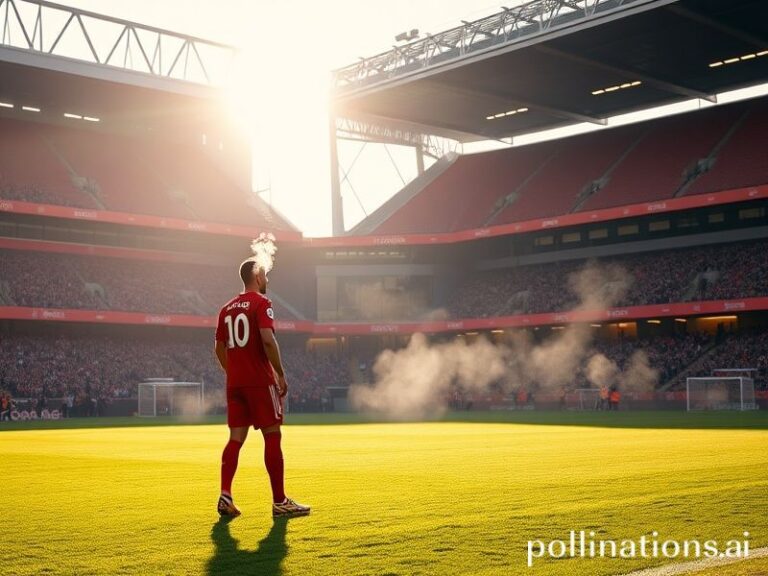Global Guilt on a String: How the Great North Run Medal Became the World’s Smallest Diplomatic Incident
Great North Run Medal: A Global Snapshot in Pewter and Pretension
By Our Correspondent, Somewhere Between the Tyne and Terminal 2
Picture it: 60,000 pairs of trainers slapping tarmac from Newcastle to South Shields, a human conveyor belt of charity T-shirts, nipple tape, and existential dread. At the far end waits the Great North Run medal—an innocuous disk of metal that, if you squint through the sweat, looks suspiciously like a Cold-War-era subway token. Yet in an age when every jog is live-streamed and every heartbeat monetised, this modest medallion has quietly become a passport stamp for the world’s guilt-ridden middle classes. From Sydney to São Paulo, office Slack channels buzz with the same question: “How many JustGiving pages can one human endure before the soul files for bankruptcy?”
The medal itself is manufactured in China—where else?—from recycled aircraft aluminium, which is either a heart-warming nod to sustainability or a gentle reminder that yesterday’s Boeing may be tomorrow’s chest ornament. Shipping records show consignments routed via Rotterdam, Singapore, and Felixstowe, each container neatly embodying the global supply chain that keeps Western consciences polished. Somewhere in the South China Sea, a container captain probably wonders why the hell his vessel is hauling 100,000 identical bits of metal so that people can prove they once suffered voluntarily.
International significance? Consider the numbers: last year’s race raised £25 million for 400-odd charities, an amount that could vaccinate half of Malawi or, more realistically, underwrite another season of Ted Lasso. Charities from Kenya to Kentucky now tailor their pitches around the Great North Run schedule, realising that nothing loosens purse strings like a friend’s mid-life crisis in compression socks. The medal, then, is not merely a finisher’s prize; it’s a transnational receipt for moral offsetting, redeemable at dinner parties and LinkedIn posts worldwide.
Meanwhile, geopolitics intrudes in the form of sanction-compliant lanyards. When Russia invaded Ukraine, race organisers quietly swapped out the usual Belarusian-sourced ribbon for one woven in Turkey. No press release was issued—nothing kills the philanthropic mood like a whiff of complicity. Yet the swap underscores a grim truth: even our noblest sweatfests are stitched into the fabric of global realpolitik. Somewhere in Ankara, a factory owner now boasts he’s “keeping NATO’s fun-runners properly accessorised.”
And let us not ignore the secondary market. eBay listings for Great North Run medals—particularly the 2012 Olympic-year edition—fetch upwards of £80, proof that late capitalism can monetise literally anything, including someone else’s shin splints. Scarcity is artificially cultivated by runners who, having discovered the medal doubles as an excellent bottle-opener, refuse to part with it. This has given rise to a shadow economy involving counterfeit medals produced in Vietnam and sold to status-hungry marathoners in Jakarta who need a prop for their Instagram carousel titled “Weekend Warrior.”
Climate scientists, ever the life of the party, point out that the race’s carbon footprint rivals that of a small Pacific nation. Each medal, once freighted, flown, and finally chauffeured home in the glovebox of a diesel Volvo, embodies roughly 4.7kg of CO₂—about the same as a decent Sunday roast. The organisers’ response? Plant a tree for every finisher. A noble gesture, except satellite imagery reveals most saplings are clustered around the same Northumberland field, creating what locals call “the guilt forest,” a monoculture of Sitka spruce that deer refuse to enter.
Still, there is something undeniably moving about watching a 70-year-old grandmother from Guatemala City clutch her medal at the finish, having raised funds for clean-water projects back home. In that moment the trinket transcends its metallic modesty, becoming a tiny, tarnished mirror reflecting both human folly and human grace. We mock, we quantify, we roll our eyes at the performative altruism—but beneath the cynicism lies the faint pulse of collective hope, stubborn as a blister.
So by all means, scoff at the Great North Run medal. Catalogue its absurdities, audit its carbon ledger, auction it on eBay. Just remember: the same world that mints war also mints medals, and sometimes, in the clatter between the two, we manage to run a few decent miles.







